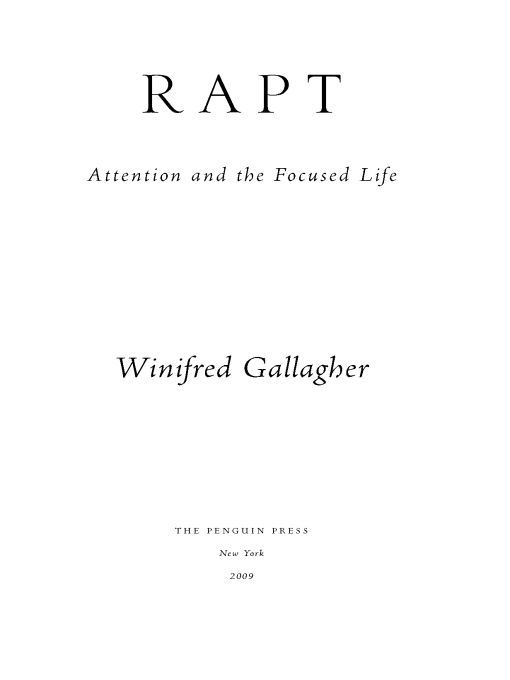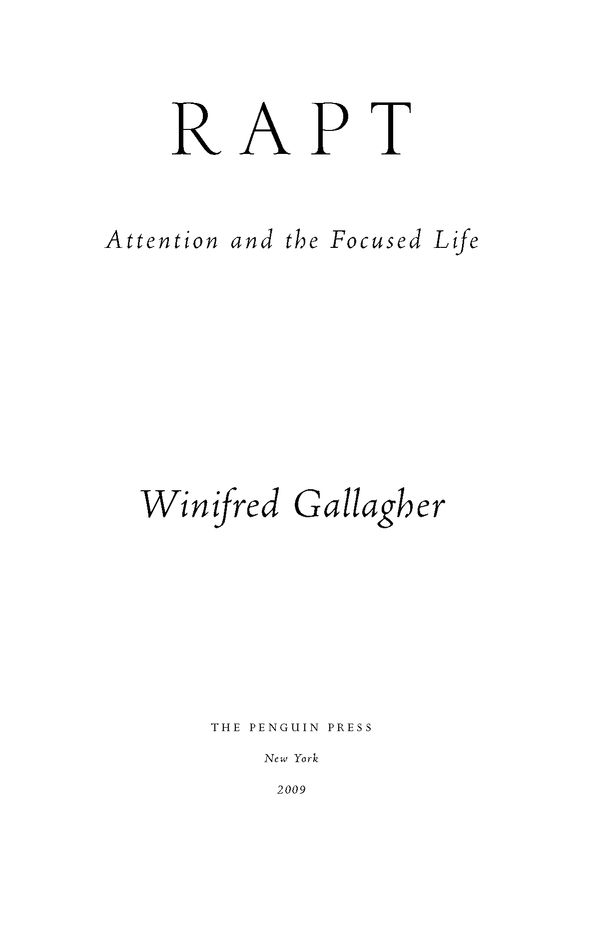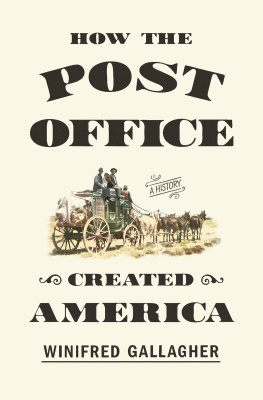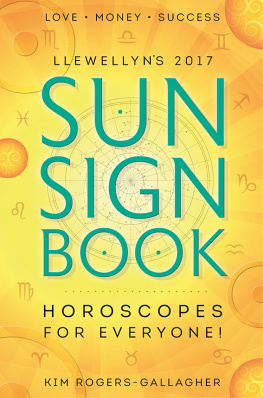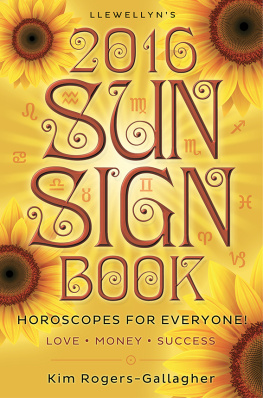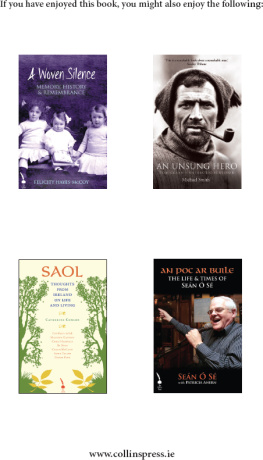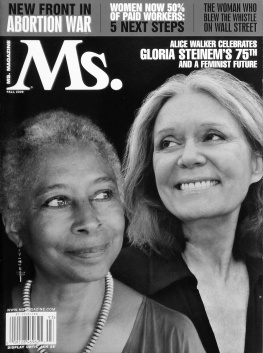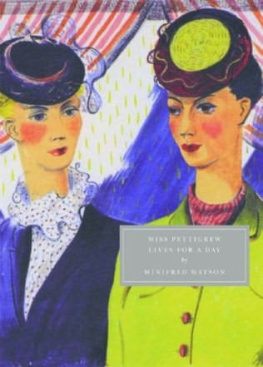Table of Contents
ALSO BY WINIFRED GALLAGHER
House Thinking: A Room-by-Room Look at How We Live
Just the Way You Are: How Heredity and
Experience Create the Individual
The Power of Place: How Our Surroundings Shape
Our Thoughts, Emotions, and Actions
Spiritual Genius: 10 Masters and the Quest for Meaning
Working on God
Its in the Bag: What Purses Revealand Conceal
My experience is what I agree to attend to.
WILLIAM JAMES
INTRODUCTION:
Choosing the Focused Life
Were all amateur psychologists who run private experiments on how best to live. Some of us specialize in relationships and mostly explore bonding. Others concentrate on work and test ways to be more productive and creative. Still others look to philosophy or religion and investigate the big picture: the ultimate way things are. Five years ago, a common-enough crisis plunged me into a study of the nature of experience. More important, this experiment led me to cutting-edge scientific research and a psychological version of what physicists trying to explain the universe call a grand unified theory or theory of everything: your lifewho you are, what you think, feel, and do, what you loveis the sum of what you focus on.
That your experience largely depends on the material objects and mental subjects that you choose to pay attention to or ignore is not an imaginative notion, but a physiological fact. When you focus on a STOP sign or a sonnet, a waft of perfume or a stock-market tip, your brain registers that target, which enables it to affect your behavior. In contrast, the things that you dont attend to in a sense dont exist, at least for you. All day long, you are selectively paying attention to something, and much more often than you may suspect, you can take charge of this process to good effect. Indeed, your ability to focus on this and suppress that is the key to controlling your experience and, ultimately, your well-being.
Attention is commonly understood as the concentration of the mental powers or the direction or application of the mind to any object of sense or thought. Recently, however, a rare convergence of insights from both neuroscience and psychology suggests a paradigm shift in how to think about this cranial laser and its role in behavior: thoughts, feelings, and actions. Like fingers pointing to the moon, other diverse disciplines from anthropology to education, behavioral economics to family counseling, similarly suggest that the skillful management of attention is the sine qua non of the good life and the key to improving virtually every aspect of your experience, from mood to productivity to relationships.
If you could look backward at your years thus far, youd see that your life has been fashioned from what youve paid attention to and what you havent. Youd observe that of the myriad sights and sounds, thoughts and feelings that you could have focused on, you selected a relative few, which became what youve confidently called reality. Youd also be struck by the fact that if you had paid attention to other things, your reality and your life would be very different.
Attention has created the experience and, significantly, the self stored in your memory, but looking ahead, what you focus on from this moment will create the life and person yet to be. Since Sigmund Freud, psychology has mostly examined our pasts to explain and improve our lives. If you think in terms of the present and future instead, you might encounter an intuition lurking in the back of your mind, as it was in mine: if you could just stay focused on the right things, your life would stop feeling like a reaction to stuff that happens to you and become something that you create: not a series of accidents, but a work of art. MY INTEREST IN attention goes back to childhood, when I ran the usual experiments on its effects on behavior. I saw that by focusing on one thing, you could ignore another. If you concentrated on some enjoyable activity, you could make time simultaneously race and stand still. Staying focused on a goal over time might not guarantee youd achieve it but was a crucial step in that direction.
In midlife, an attention experiment of a different magnitude set me on the path that led to this book. Walking away from the hospital after the biopsy from hellnot just cancer, but a particularly nasty, fairly advanced kindI had an intuition of a highly unusual blue-white clarity. This disease wanted to monopolize my attention, but as much as possible, I would focus on my life instead.
As Samuel Johnson observed, the prospect of hanging wonderfully concentrates the mind. Right from the start, my attention experiment went well. Through many months of chemo, surgery, more chemo, and daily radiation, I mostly stayed focused on taking care of business in the presentsuddenly all I could count onand on the things that matter most and make me feel best: big ones like my family and friends, spiritual life, and work, and smaller ones like movies, walks, and a 6:30 p.m. martini. As a result, I spent very little time and energy on the past or future or on the suddenly very many things that seemed unimportant or negative. I began to relish corny admonitions to Have a good day! and my husband started referring to our house as Harmonia.
Thats not to say that cancer was the proverbial best thing that ever happened to me, or that Im glad I had it: it wasnt, and Im not. Nor was my focusing strategy 100 percent effective 24/7. There are moments in lifewhen someone hands you a pink slip, perhaps, or cant find your good chemo veinwhen you just cant immediately shift your attention to what to have for dinner, much less to the music of the spheres. Then too, stimuli that you dont consciously focus on, such as a scowling face in a crowd or an unpleasant noise, can sometimes sneak into your brain and influence your behavior, albeit weakly.
Nevertheless, throughout a long, grueling ordeal, I cleaved to the principle that your life is the creation of what you focus onand what you dont. Whenever possible, I looked toward whatever seemed meaningful, productive, or energizing and away from the destructive, or dispiriting. I found that I could pretty much carry on with business as usual and stay in pretty good spirits, too. No doubt partly because I was really present in the moments we shared, kind people appeared to enjoy my seemingly sepulchral, bald-headed company. Although that year was not my easiest, neither was it the hardest. Certainly, it was my most focused.
A psychological theoryyour life consists of what you focus onis one thing in your mind or on paper, and something else again when you test-drive it over rough terrain. I was impressed enough to start thinking seriously about attention not just personally but also professionally, as someone who writes about behavior. I began with some questions:
What is attention, exactly? What happens in your brain when you focus on something? Does the same process apply to thoughts and feelings as to sights and sounds? How does your characteristic way of focusing affect who you are? Why do certain things grab your attention? How come bad stuff, like the site of a car crash or an overheard insult, is more riveting than good stuff, like pretty scenery or a direct compliment? Is the difference between common glitches such as mind-wandering and serious problems such as ADHD one of quality or quantity? How do you pay attention to something over long periods of time, as you do to your career or health?

